From film extra to actor, my days on a movie set bring new respect to a tough profession
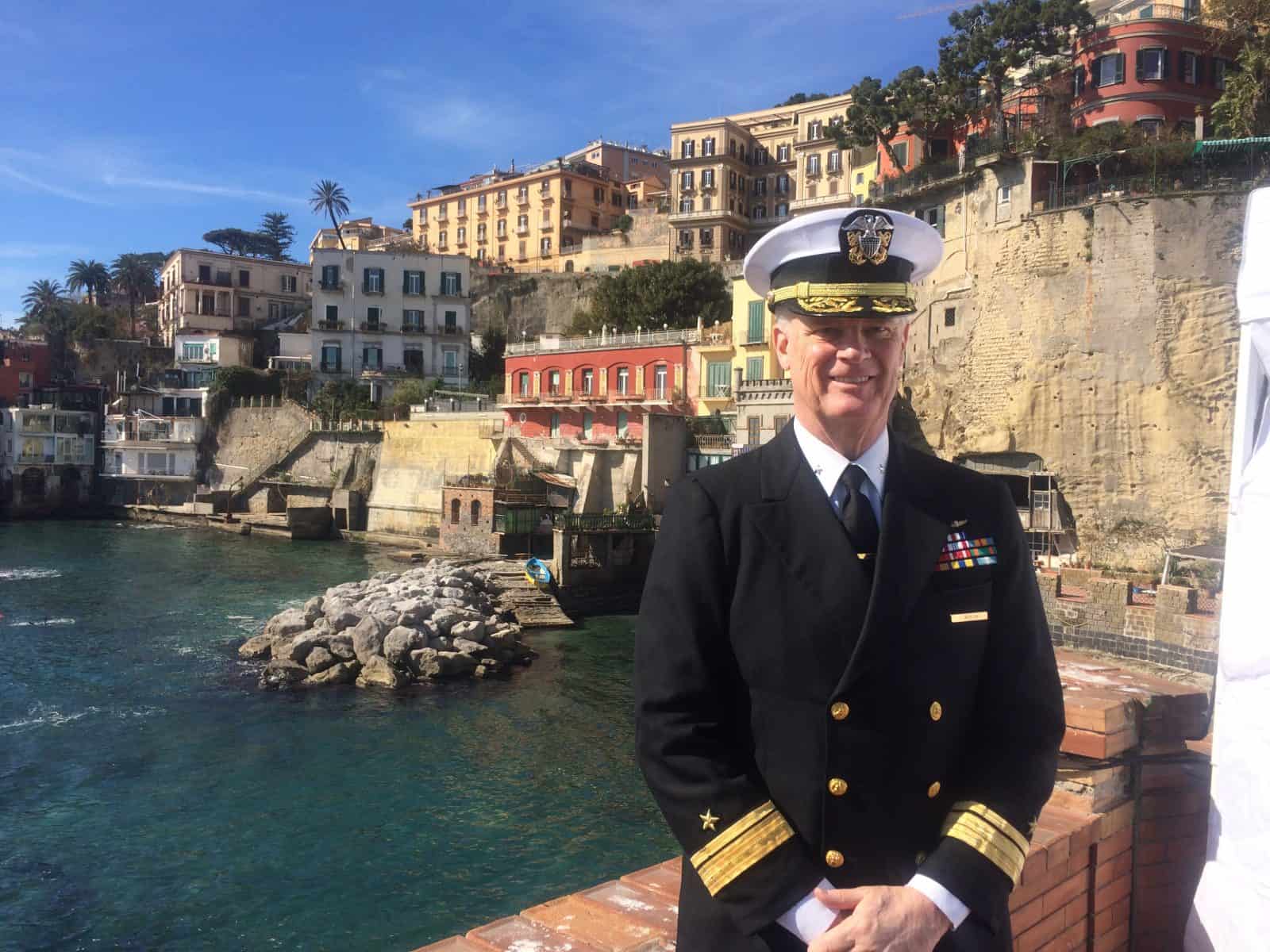
We take a break from our regularly scheduled update on the biggest human tragedy of our lives to bring you something almost as awful.
My acting career.
If you’ve followed my blog, you know I developed a side career as a film extra. I had a good 2018-19. I played an American cardinal in “The New Pope” on HBO, a Carabiniere in “Blood & Treasure” on CBS and a German banker in “Devils” on Sky. Combined with my first appearance as a cardinal in “The Young Pope” in 2016, I’ve developed a decent credits list, not to mention a keen ability to butcher Latin.
However, in one film out now I jumped up in class. I went from a common film extra, a comparsa in Italian, human furniture in any language, to a real character, someone who actually had lines.
I would have to act.
Going from film extra to actor is like a sportswriter climbing down from the press box to quarterback against the ‘78 Steelers. It’s terrifying, humbling and harder than Marlon Brando’s chin. It’s rock climbing without prior training.
The film, “Tornare” (“Return” in Italian), was scheduled for a spring release to the big screen. However, the coronavirus shuttered cinemas all over Italy and it’s now available, for rent, on YouTube, Google Video, Infinity, Chill, TIMVision and Sky Primafila. Since many of you have gone through Netflix’s collection all the way through documentaries on sawdust, this might be an appealing alternative. Beautiful scenery. Beautiful women. And me somewhere in the background, trying to talk.
This is the perfect chance to escape death totals and doomsday scenarios in a real-life horror story and delve into some Italian fiction. Let me explain how it all happened.
I’m the prototype American
As a member of Rome’s extras pool, I’d occasionally get calls when a film or TV series filming in Italy needed an American in the background. I’m tall and I’ve been told I have a very American face, as if I jumped off a Chevrolet commercial. On this one crisp, clear day in February last year, I felt as calm as if I was walking to a bar instead of a movie studio office.
I wasn’t given much information over the phone. I never am. They wanted me to play an American military man for an independent Italian movie filmed in Naples. I know how these “interviews” go. I walk in. An assistant casting director looks at me, asks a few questions, takes photos and lets me know later when to report. For “The Young Pope,” which featured Jude Law playing the first American pope, director Paolo Sorrentino was desperate for American extras. I walked in, and an assistant casting director looked at me and said, “You’re hired.”
They’ll either like my look or not. No preparation or talent required. No pressure.
I took a train and subway to my old Prati neighborhood near the Vatican and walked 10 minutes to the office on a quiet street near the Tiber River. I took a rickety elevator and met Clara, a pretty young assistant director, and four people going over the script.
We exchanged pleasantries and then she threw the first curveball of my young acting career.
“Wait,” she said. “I’ll get you your lines.”
“Lines?” I said as if she was handing me pitons and a rope. “What lines?”
“The lines for the movie,” she said.
Huh? She handed me two pages with eight lines blocked off in ink. The lines were in English. They may as well have been in medieval Bulgarian.
“You want me to speak these lines?” I asked. “You mean, like memorize them? When? Now?”
“Yes.”
“What?! I’ve never done this before. I’m not an actor. I’m an extra.”
“That’s OK. Go ahead and read these lines.”
No time to panic
An actor once told me never tell a studio you’re just an extra. Make them think you’re an actor and you’ll get better roles. I never lie. If their expectations of me are anywhere above the ground floor, I’ll be thrown out as a lying fraud.
I didn’t have time to be nervous. We went into her office and she set the scene. The movie was originally called “In Buona Compagnia (In Good Company).” The vague outline is an Italian woman returns to Naples after years in the United States to attend her father’s funeral. Upon her return she discovers all kinds of bad memories.
I play an American officer at the funeral reception, talking to other American officers about her father and our roles in the past. She pretended to play one of the officers. She fed me the other lines while holding a little video camera at my face.
The plot could’ve been a slasher movie or a porn film as far away as my mind raced. Acting for the first time in front of an assistant director is somewhere between an out-of-body experience and pure, unadulterated panic. I’ve never acted in my life except for reading a line of Latin in a makeshift Sistine Chapel in “The New Pope.” I did not want to look like one of those athletes you cringe watching while he grinds through a horribly awkward, stilted cameo appearance. They all sound like those robots in a Disneyland ride.
Now I know why.
At least she allowed me to read off the script. I did the best I could. We did about nine takes. I went from reading with all the voice range of a North Korean news anchor to the awkwardness of a high school kid talking to a pretty girl at a dance. To relax me, she put a plastic cup in my hand and said to pretend it’s a cocktail.
I said the cup would help more if it wasn’t empty.
I read the lines over and over, each one with a little more emotion. Each time it became more natural. But after a certain point, I was just reading words. They could’ve said anything. It’s like saying “elephant” 20 times. It’s the difference between real acting, where you become that character, and some guy off the street embarrassing this noble profession by trying to act for the first time.
“You did well,” she lied. She then filmed me walking and said if I don’t get a speaking part, I’d at least be part of the group of officers chatting in the background. “You are very, very handsome,” she lied again.
I did my research
As I took the bus home, I contemplated this possible new life. Many people reinvent themselves in retirement as a photographer, an English teacher, a tour guide. But an actor? I was 62. At that age, you’re supposed to take golf lessons, not acting lessons.
I wrote a friend in Los Angeles who has carved out a living as a character actress in plays, commercials and films. She was very encouraging about my concerns of the Everest-size mountain that acting seemed to me. She said the star in “Roma,” which had just won the 2018 Oscar for Best Foreign Film, had never acted in her life and she earned an Oscar nomination.
But this woman, Yalitza Aparicio, really was an indigenous American from Mexico City and the daughter of a housekeeper. She practically played herself. If they shot a movie here about American sportswriters, which would be the worst film in the history of Italian cinema, I wouldn’t even need a script. Here I am playing an American military commander, and I don’t even like the American military.
A few days later I received an email. I got the part. And I had lines, and I would leave for Naples in three weeks. I had to find some pitons.
***
Looking at your lines in a script is exciting until you try reading them without the script. Then it becomes terrifying. The directors took pity on me and cut the amount of lines I read in the audition to only two. In the script I am listed as “MAN IN UNIFORM 3” which, I think, is the male equivalent of THIRD GIRL IN SHOWER. I’m talking with MAN IN UNIFORM 2 and have the following exchange:
MAN IN UNIFORM 2: “Patrick was the right man for the job.”
ME: ‘Yeah. He built that base. From the ground up …”
MAN IN UNIFORM 2: “April of … ‘54?”
ME: “The Suez Crisis … We’re still monitoring that canal twenty-four seven.”
MAN IN UNIFORM 2: “He made Nisida what it is. Built it up from nothing to one of our most important outposts, vital for security.”
It was only two lines yet reading it outloud I sounded like I was reading out of a zip code directory. I couldn’t garner any emotion, any life. When I did I went way over the top like athletes do when they embarrass themselves in car commercials.
I took my actress’ friend’s advice and watched Michael Caine’s video on how he views acting. I remembered the Ivorian actor in “The New Pope” who told me not to tie myself to the script, to not be afraid to wing it. So after three weeks of trial and error, of talking to myself in front of various mirrors, I had memorized the lines. I became a reasonable facsimile of a world-weary military commander.
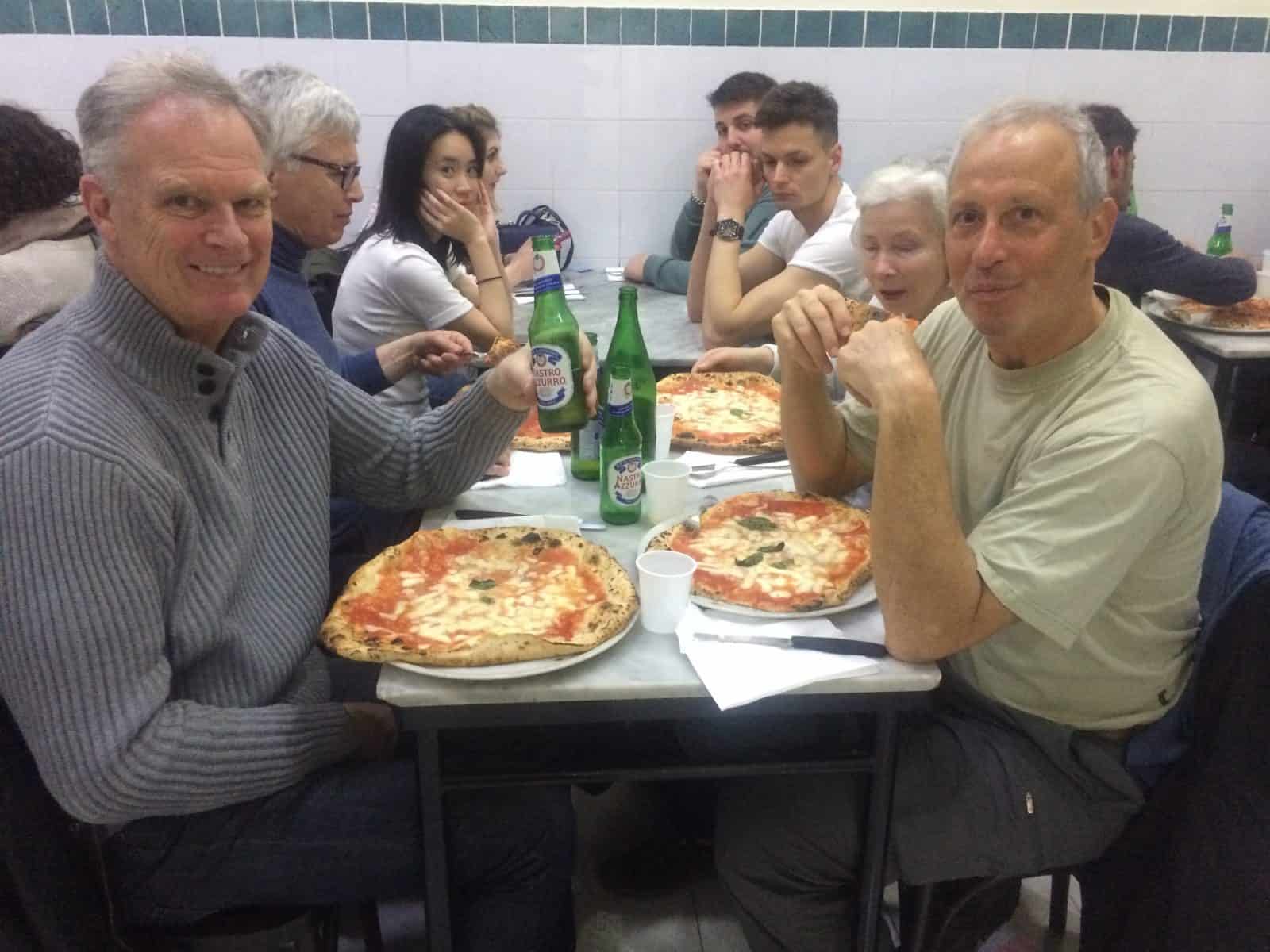
I took the train down to Naples with MAN IN UNIFORM 1. Larry Kapust is a trained American actor from Brooklyn who has worked as an actor in Italy for 30 years. Tall, fit without a line on his face, he moves well for 64 and having had a hip replacement just 46 days before we met. He has been in numerous Italian films and TV, including “The Traitor” and “Un Posto al Sole.” He has dubbed films in English and Italian, including dubbing Stitch in the Disney production, “Lilo and Stitch,” from 2003-08.
He had been given the dialogue that I tried in the audition. I saw him lip reading lines from his script as the train sped south. I never hung out with actors before but in my limited experience as an extra, few professionals are more remarkable. To sit in the “College of Cardinals” and see Jude Law spin a 10-minute speech for eight or nine takes without missing a syllable seemed herculean.
I would gain even more respect in two days in Naples.
Beautiful set
We arrived and a van whisked us up Naples’ beautiful shoreline into the Presidio neighborhood. It’s lined with huge houses on a hill looking down at the Bay of Naples, royal blue on this sunny March day. I asked the driver if the Camorra crime family lived up here.
“Solo i capi (Only the bosses),” he said only half in jest.
He dropped us off at a cramped second-story apartment where we did our costume fitting. I tried on four identical admiral jackets. I must admit the one appeal of the U.S. military is the dress uniform. I actually looked sharp with the navy blue jacket and matching tie with yellow stripes and white, broad-brimmed hat. However, not one jacket was big enough to fit even an Italian jockey. No wonder Italians kept losing wars. They’re too little.
In the apartment I met Carla Cafagna, your prototype, beautiful Italian actress from Naples. She plays a real estate agent and is a veteran of many films such as “Suburra,” my favorite Italian TV series, and “Croce e Delizia.” I went back to the train station with her and in very good English she talked about her life as an actress since moving to Rome 19 years ago. She loved being back home where the people are more gentle, more warm.

I later looked up one of her scenes called “Insieme” (“Together” in Italian), where she consoles a pregnant young woman. She’s terrific, even more so after meeting her. I’m suddenly intimidated by her talent, her mere presence and what lies ahead for me.
I am so far out of my league I need a passport just to step in the same cab with these people.
On the train back to Rome, Larry gave me some tips.
“Pretend you’re in that moment,” he said. “You are that scene. You’re talking about a guy named Patrick from the past in ‘54. Pretend you know Patrick. You watched him build that canal. Make it important to you.”
I wrote the above tip in all capital letters on the script to remind me. He also warned me: “Don’t be offended if the director tells you to put more strength or less after she hears you.” I will have no problem with instruction. I watched Paolo Sorrentino have John Malkovich do 10 takes of the same speech in “The New Pope.” I can do multiple takes of two lines. I am not John Gielgud playing Hamlet. I’m Man in Uniform 3.
Time to climb the rock.
***
Four days later we returned and checked in at the Hotel Naples, a nice, no-frills three-story hotel on Corso Umberto I in the heart of Naples’ historical center. Larry and I walk to Da Michele, Naples’ famed pizzeria that is either the first or best pizzeria in Italy, depending on who’s talking. Larry talked about the roles he played and how hard it is to dub voices. Even though you’re speaking a different language than the actor, your lips must move at the approximate same time as the actor on the screen.
He said the acting market in Italy is brutal. Even famous actors struggle for roles. He said he played a role in a Gen. Patton movie called “In Guerra per Amore” (“In War for Love”) where they flew out a guy from California merely because he looked like Patton. He never acted a day in his life. OK, I said, so I have nothing to worry about?
“He made a ton of mistakes,” Larry said.
O merda (Oh, shit.).
The next morning a van took us farther up the coast road to this spectacular 17th century villa across the street from the sea. Inside, a huge picture window perfectly framed the Bay of Naples. On a crisp, sunny day, it showed Naples’ polar opposite from “My Brilliant Friend,” the blockbuster TV series about life in Naples’ slums in the ‘60s.
Joining us was John, a film maker from southern California who plays Man in Uniform 2. Three of us stood, looking sharp in our uniforms practicing our lines in a big salon lined with photos of the deceased and of Patrick’s two daughters at various ages.
John and I went through our lines with machine-like precision, a little too machine like. Then Larry made us feel like the rank amateurs that we are, like we just walked in off the docks, which we practically did. This is when my respect for acting reached a new level, when what you see on screen isn’t close to the skill involved in making it happen.
Larry took the same lines I struggled with in my audition and made them come to life.
“We RACED through the canal, then held at 35 knots all the way to the gulf … It was hot as hell. The hottest summer ever.”
He smiled. He shook his head in slow admiration.
“Hormuz. They were dragging the whole way … We had to slow to keep the formation.”
His eyebrows raised. His voice raised. The lines that came out so stiff and phony out of my mouth in the audition came to life out of Larry’s. He’s a pro’s pro. Suddenly, Larry Kapust was a U.S. admiral. He not only looked like one. He acted like one. Me? I looked like a retired sportswriter earning vino money.
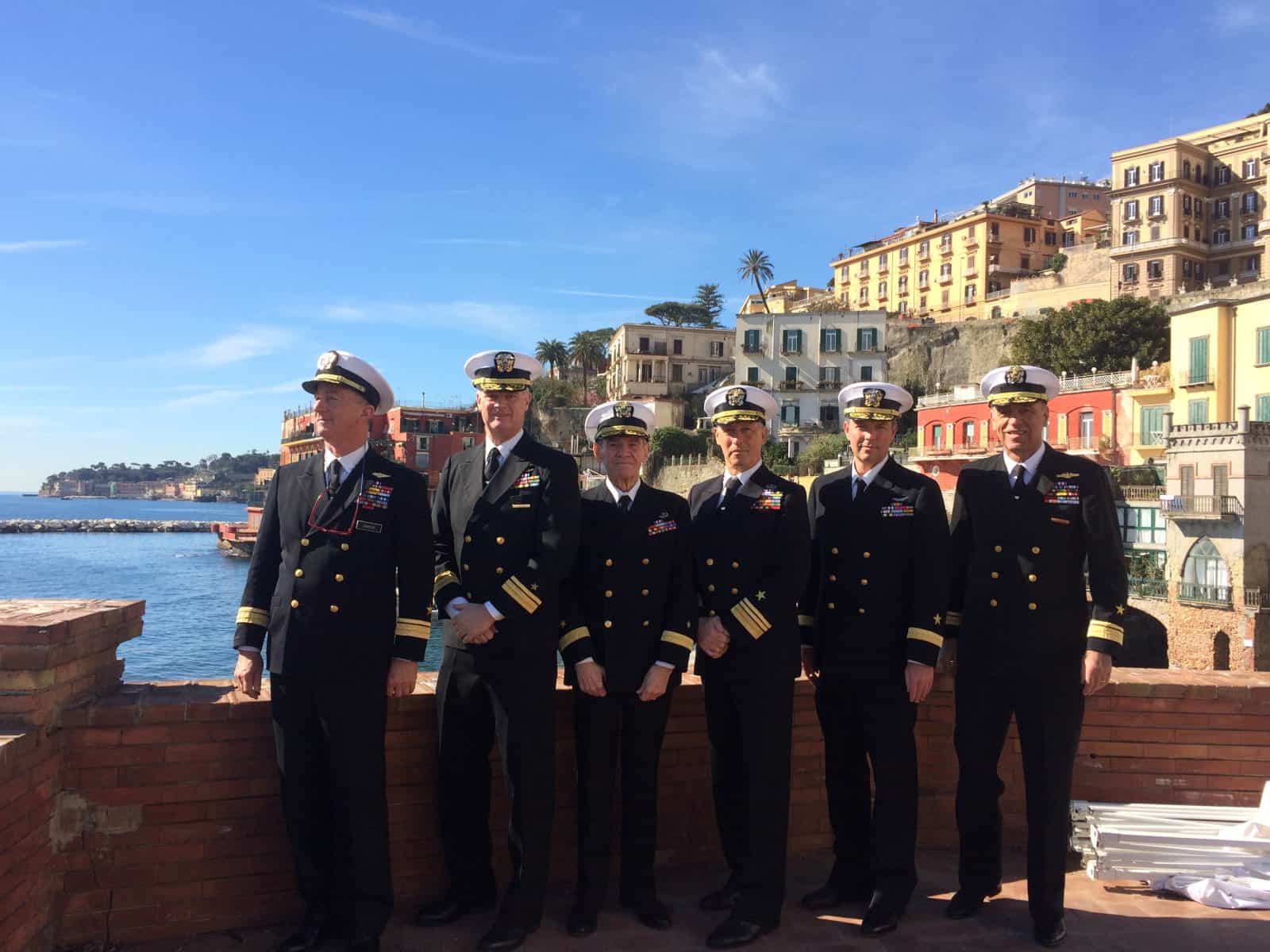
Days are long on movie sets. We were picked up at 7:30 a.m. and didn’t return to the hotel until about 7. We shot so many scenes but not ours. We six admirals spent much of our time across the street on a perch overlooking the sea and beautiful, brightly colored seaside buildings beyond.
That night, Larry and I went to dinner with Barbara Ronchi, one of the stars of the movie. She plays the younger sister of Virginia, the main character played by Giovanna Mezzogiorno who’s haunted by her past. Ronchi is a veteran, playing in such films and TV series as “Grand Hotel” and “Fai Bei Sogni” (“Sweet Dreams”). She’s quiet, modest and looks as Italian as a bottle of Chianti on a vineyard picnic table.
We ate at ‘A Figlia d’o Marenaro, Neapolitan dialect for “Sailor’s Daughter.” It’s a classic Neapolitan seafood restaurant with outdoor seating and fantastic octopus salad and spaghetti ai frutta di mare. We ordered a 30-euro bottle of Amaro, a deliciously bitter liqueur only found on Ischia, Capri’s sister island off the coast of Naples.
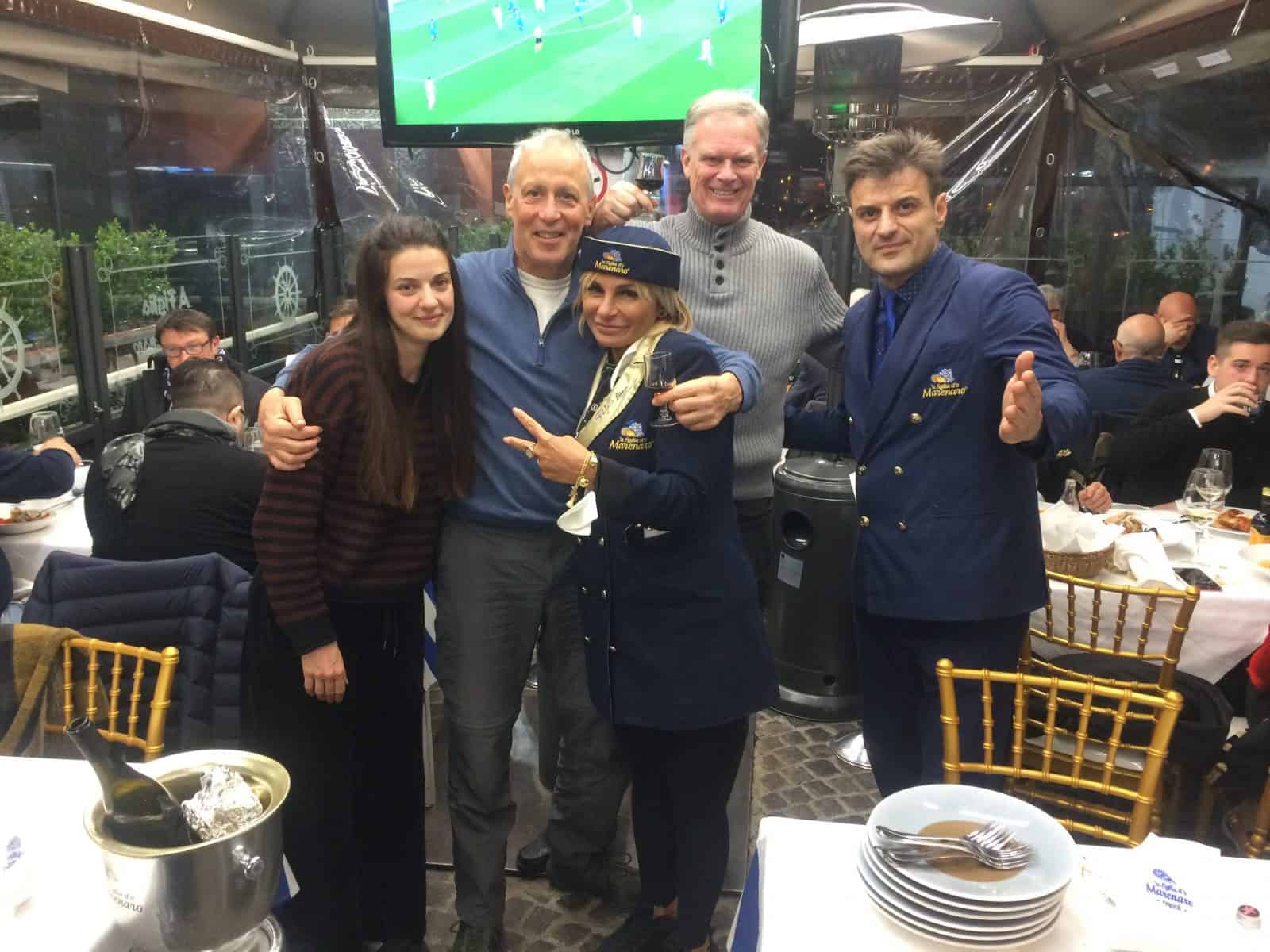
I could get used to this movie lifestyle. If only I could act.
***
Another gorgeous blue sky greeted us the next morning when we arrived at the villa. A kayaker paddled by us in the sun as we waited for our scene. They got to it early. We had our cue when Vincenzo Amato, who plays the lead opposite Mezzogiorno, talks with her then walks by us.
Larry hits his lines like the old pro that he is. John hit his cue and I didn’t butcher “From the ground up.” I even managed to shake my head, almost naturally, when I said, “We’re still monitoring that canal 24-7.”
Not having a clue how I did and being a writer, I needed a quick review. Assistant director Francesca Polic came over and gave me the thumbs up and said, “Benissimo!” I asked how we did.
She whispered, “Better than our actors.” I like how they lie in this business.
We spent another scene pantomiming a fake conversation as background noise. Larry made up a story about a smoking-hot wife of an ambassador to England. I chimed in by telling Larry she left the ambassador and is available if he wanted to take his chances. Not a single word would ever make the final cut. They only wanted to see our lips move and occasionally form a smile.
It is more than a year later and in Italy, the first country to go into complete lockdown, things are starting to open. Cinemas, however, are not among them. I wrote one of my studio contacts who told me where to find “Tornare.” I rented it on YouTube and saw the Italian subtitles used are only for the few lines spoken in English.
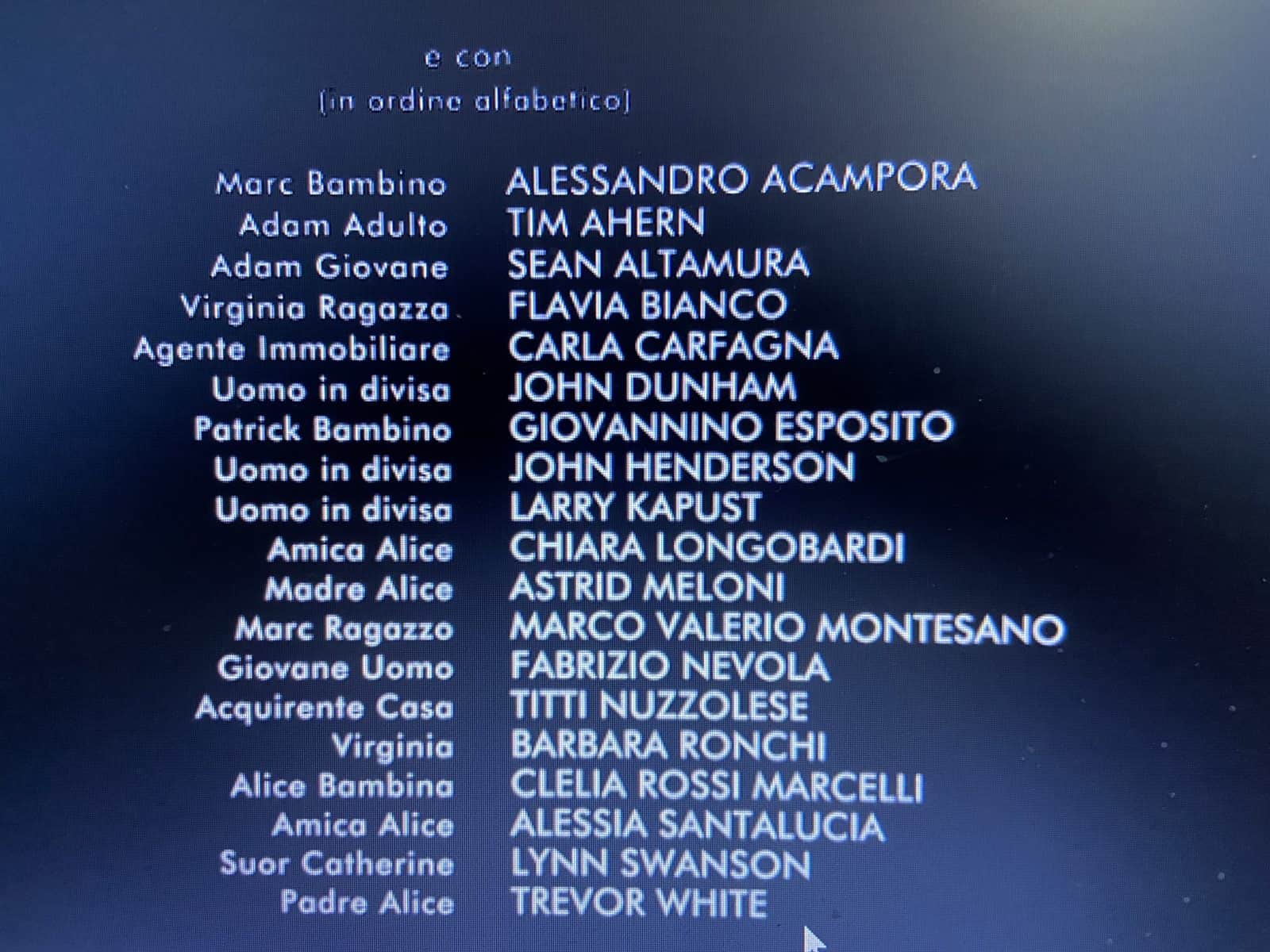
Despite nearly the entire movie in Italian, a language I read, write and speak much better than I understand, I watched it Sunday afternoon. Incredibly, my scene is Scene 1. We’re in the background, chatting quietly. I can see the back of my head and lean toward Larry to say something quieter.
That’s it.
Our lines — all of them — were shredded and thrown into the Bay of Naples. I was nothing more than another extra. Yet I’m not upset. That’s life in movies. Learning new life skills is what retirement is all about. Acting was never on my retirement bucket list but knowing I could do it, even if no one saw it, is something you can’t achieve in a Barcalounger or a golf course or a corner bar. I gained even more respect for a profession that is still under appreciated despite the fame, fortune and accomplishments of worldwide household names.
I watched the rest of the movie and it does fit its billing as a “psychological thriller.” Virginia sees her past unfold by her younger selves played by actresses about 10 and 17 years old. She sees some of the awkward events of adolescence and must live through one of her worst nightmares. Beautifully shot on the Bay of Naples, the villa makes you wonder how much a retired U.S. admiral really makes.
The film was not well received. Mezzogiorno and director Cristina Comencini had paired together in “La Bestia nel Cuore” (“The Beast in the Heart)” to earn an Oscar nomination for Best Foreign Film in 2006. Wrote BLOGO, an Italian TV website, “Tornare is a work sometimes inexplicable and unjustifiable in its questionable evolution.”
Alas, it will be my last touch with the silver screen. It was later discovered that my particular visa does not allow me to work in Italy. I just had the shortest acting career since O.J Simpson.
But like O.J., what a great run I had.


May 14, 2020 @ 10:40 am
Wonderful story, John … I applaud your courage in making a run, albeit short, on the silver screen. I simply could NOT do it — for more reasons than I could list. My videos for CUBuffs.com usually left me terror stricken, and I was talking sports in those! Stay with the prose, you’re very good at it! Best, bgb
July 21, 2020 @ 9:56 am
Hello John, great post! Good for you for trying something new!
I just moved to Rome from LA in January and have recently thought about working as a background extra. Can you recommend some agencies or provide any advice? Thanks in advance!
October 10, 2020 @ 10:32 am
Hey, maybe they have a role for “smug boomer who thinks travelling makes them special but still doesn’t know the difference between carabinieri and carabiniere after years in Italy”
October 11, 2020 @ 5:37 am
Nice catch. Thank you. Yes, I know the difference. Mistakes happen. I bet it’s nice to go through life never making one, right?